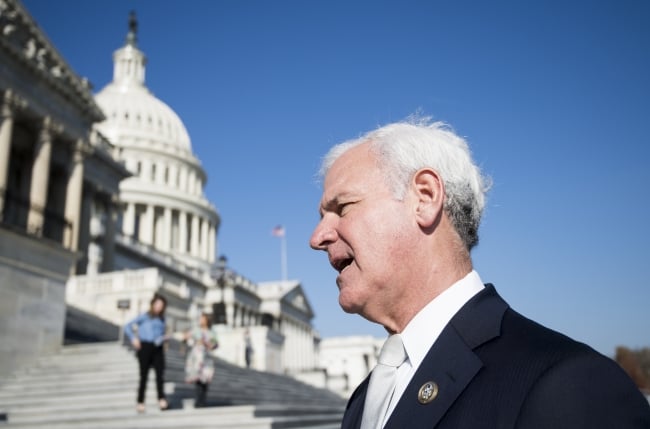You have /5 articles left.
Sign up for a free account or log in.

Getty Images
Bradley Byrne came to the U.S. Congress after a stint as the leader of Alabama’s community college system. But the Republican's signature higher education bill so far backs a priority of many private institutions: the repeal of a new tax on college endowments.
Byrne says the legislation, which he co-authored with Representative John Delaney, a Maryland Democrat, reflects his view on the proper role of the federal government in higher education.
“I have the same concerns that other members of Congress have,” he said in an interview. “I’m just a little bit differently informed about it because I come from inside. I don’t want to punish people in higher education. I want to find ways, in a positive sense, to motivate them to do what they should be doing anyway and to do it better.”
As chancellor of the Alabama Community College System from 2007 to 2009, Byrne oversaw the system's 30 two-year colleges. He also headed the state's work-force development efforts.
Byrne's concerns reflect those typically voiced by conservative lawmakers -- complaints about alleged threats to free speech on campus, rising tuition prices and what they see as administrative bloat. But Byrne says he’s not letting those issues get in the way of what he believes is appropriate tax policy.
The Tax Cuts and Jobs Act, which Congress passed in December without any Democratic votes, included a new excise tax on private college endowments that’s projected to affect more than 30 institutions this year. It taxes investment income at private colleges with an enrollment of at least 500 students and assets valued at $500,000 per full-time student.
The final bill was a more narrow version of proposals included in earlier drafts of the legislation. And colleges are still waiting for details on how the tax will work -- the U.S. Department of Treasury indicated recently that regulations clarifying the law won’t be issued until later this year. But higher ed groups argue the tax sets a bad precedent. And Byrne, who voted for the final tax bill, agrees.
“First of all, it’s a new tax and I don’t know why in tax reform we’re talking about a new tax,” he said. “Secondly, I don’t like the policy concept of taxing charitable giving.”
That’s especially problematic for college endowments, Byrne said, because money from endowments is used to provide financial aid to low-income students. He has a personal connection to that issue, having received campus-based financial aid to attend Duke University as an undergraduate.
Massive university endowments, however, have for years been favorite targets of Byrne’s fellow congressional Republicans, who argue that colleges are not doing enough to reduce the cost of tuition and fees. For example, Senator Charles Grassley, an Iowa Republican, has periodically renewed the issue, charging colleges with "hoarding assets at taxpayer expense."
And Representative Tom Reed, a New York Republican, last week announced new proposed legislation that would require the wealthiest colleges to spend 25 percent of annual earnings from their endowment on aid for low-income students.
The tax law itself did nothing to address college affordability issues -- it simply redirected money from endowment income to the U.S. Treasury in order to offset the cost of large tax cuts for businesses.
But Dean Zerbe, a former Grassley adviser on tax issues, told college presidents at an event Inside Higher Ed and Gallup hosted in February that they shouldn’t have been shocked by what was in the bill or by dissatisfaction with higher ed from members of Congress.
“If you were surprised, you weren’t paying attention,” he said.
Byrne said he agreed and that college leaders have work to do to improve communication with lawmakers.
“I do think colleges and universities have done a very poor job of relating to members of Congress and responding to issues that many of us have on both sides of the aisle,” he said.
Overemphasis on Four-Year Degree
On the right, much of the focus on college campuses for the past two years has been devoted to free speech issues -- from the protests over Milo Yiannopoulos at the University of California, Berkeley, that drew a rebuke (and a threat to cut federal funding) from President Trump to less high-profile showdowns over controversial speakers elsewhere.
Byrne and other Republicans say universities have built up large bureaucracies with administrative bloat that helps fuel higher tuition rates. (Byrne's staff cited a report on regulatory burdens from the American Council on Education and a study from Vanderbilt University, although both focused on the costs to universities of complying with federal rules. Some researchers, including Robert Kelchen, an assistant professor of higher education at Seton Hall University, have found limited evidence of explosive growth in academic administrations. And data from the College Board show the proportion of noninstructional staff declining over time across all higher ed sectors.)
Compounding those issues, Byrne said, is a failure by many college leaders to engage actively enough with their representatives in Congress.
“I’m painting with a broad brush and this is not true for every university. For example, universities in the state of Alabama are very communicative,” he said. “But I don’t think universities have done a good job of communicating in general with members of Congress, and they should be thinking more about that.”
One of the strongest supporters of the endowment tax, he said, had a strained relationship with the university in his home district.
Byrne, meanwhile, has made a point of seeking input not just from the colleges in his home district but from his alma mater as well. Duke’s government relations office originally brought the endowment-tax issue to his attention. (The university is not expected to be affected by the tax, at least initially.)
Chris Simmons, associate vice president at Duke's office of government relations, said having come from a leadership post in higher education, Byrne understands the relationship between the federal government and colleges and universities.
“It gives him a unique and important background as a federal policy maker,” he said. “To have someone like that in Congress is extremely important for those of us who advocate for higher education.”
Simmons said Byrne’s support of repealing the endowment tax doesn’t make him a lonely voice in the Republican caucus.
“I wouldn’t say he’s an outlier from the Republican Party by any means or he’s out on his own on this,” Simmons said. “There’s probably a lot of people in his party who have expressed concern.”
Besides Byrne and Delaney, the endowment tax repeal legislation has seven co-sponsors. Two of those are Republicans -- Texas representative Lamar Smith and Virginia representative Bob Goodlatte -- and fairly conservative ones at that. The bill’s Democratic co-sponsors, meanwhile, include Zoe Lofgren, a relatively liberal representative from California.
While the list of lawmakers backing the bill so far is modest, the co-sponsors indicate broad bipartisan concern about the tax. Simmons said colleges must find strong advocates no matter where they are on the political spectrum.
“Our job is to look at issues affecting us and identify good proponents and good advocates on each one,” he said. “We may find someone who’s outstanding on support of NIH research, but we may not see eye to eye on an issue involving student loans or immigration. That’s OK.”
And while Byrne is a supporter of higher ed on the endowment issue, he doesn’t shy away from calling out the failures of college leaders, or from supporting the Trump administration’s push to boost alternatives to four-year college degrees.
“I agree with [Education] Secretary [Betsy] DeVos,” he said. “We have overdone it with regard to our focus on four-year college education. Most people don’t want to spend four years in college. Most people want to spend only the time they have to spend in college to get whatever it takes for them to get a job that pays them good money.”
Most concerning to Byrne about what he sees as a potential overemphasis on a traditional college degree is the number of students who leave school with debt but no degree.
Federal data has shown student loan defaults have been concentrated in the community college sector -- where Byrne served in Alabama -- and among those who attended for-profit institutions. He said two-year-college students in particular face significant financial barriers beyond the cost of tuition, including transportation or childcare.
“We ought to be able to find ways to get that money to them so we don’t let the fact that a car broke down keep somebody from getting an education who needs it,” he said.
Byrne said he wished more grant aid could have been included for those students to address emergency financial barriers in the PROSPER Act, the proposal by House Republicans to update the Higher Education Act. He said those funds possibly could be more appropriate for a reauthorization of the Perkins Career and Technical Education law or the Workforce Innovation and Opportunity Act.
But Byrne said PROSPER took the right approach by applying the same accountability approach to all sectors of higher education. The federal government has a responsibility to provide some financial oversight of student loans, he said -- for example, by requiring colleges to advise students before they take out new loans. And Byrne said students should be given as many opportunities to choose a particular type of higher ed program as possible.
“The genius of American higher education is its diversity,” he said. “That’s four-year colleges, two-year colleges, for-profit colleges, not-for-profit colleges, public colleges, religious institutions, secular institutions. It’s that rich diversity we have out there. When we focus too much on one part of that diversity to the exclusion of others, I think it really has been harmful for people.”








